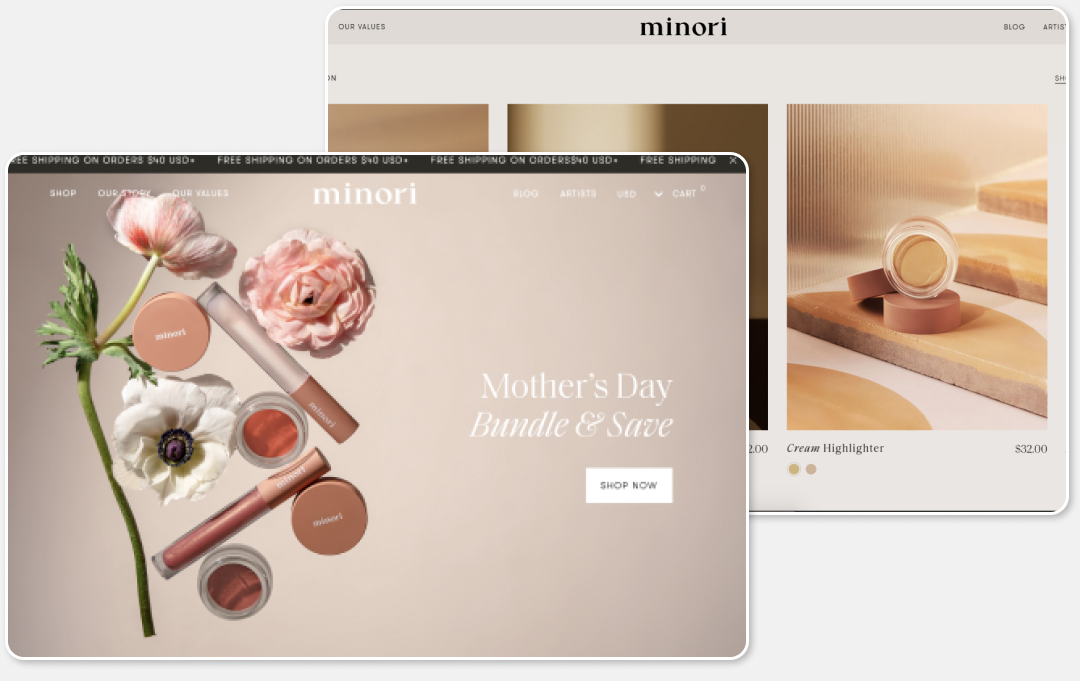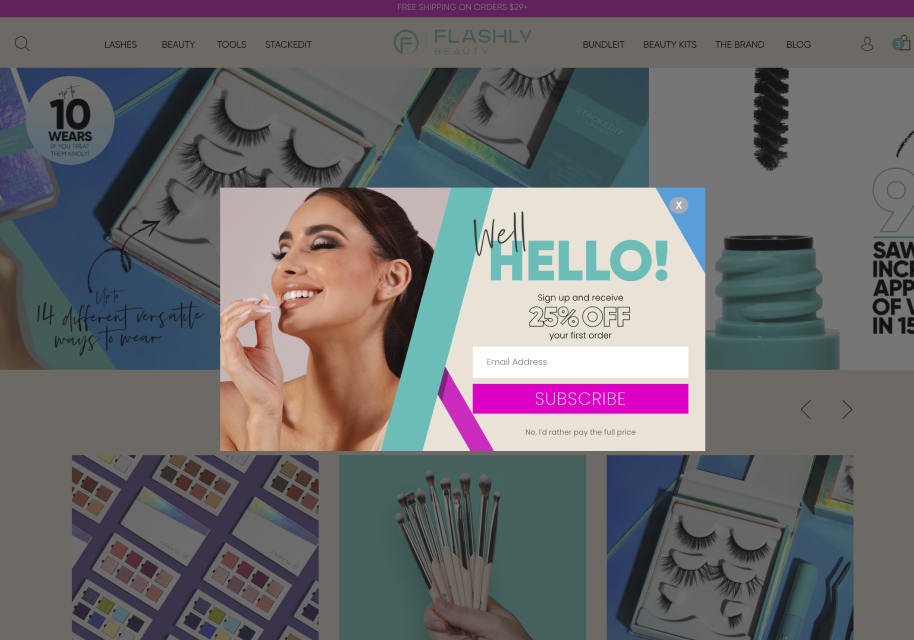Shopify Headless Commerce
Headless architecture is your technological independence. Change any component of the system without having to restart from scratch. Consider integrating any services and subsystems, focusing on commercial goals rather than platform ecosystem restrictions. Create entirely unique user experiences on any device with endless freedom. Scale your Shopify store system without limitations. Control your system and be in command of it.



Headless Commerce: What it is & Why it Matters
Decisions are the lifeblood of any business. Not all decisions are created equal, and some of them might seem small, yet some of them have the potential to jeopardize the entire company. How critical is it to choose an e-commerce platform? What happens if the platform cannot meet your organization's demands and needs to be changed? What if it becomes evident only after the system is completed? In most situations, this results in significant expenditure of money and time. The headless approach allows you to simply attach another without rebuilding everything. The best architecture minimizes the cost of a choice, while ideal architecture enables you to avoid making it.
In a cloud-native, multi-experience world, digital commerce platforms are continuing to be modularized. Therefore, application executives in digital commerce should plan for a "composable" approach that uses packaged business capabilities to get future-proof digital commerce experiences. "Composable" systems are not entirely new to enterprise software development and are closely related to microservice architecture.
Develop Composable Commerce Platform
Headless commerce changes the way you think from a "platform-centric" perspective to a "customer-experience-centric" one. To create agility in delivering experiences, subsystems are combined to form composable platforms aligned with the future of apps.
Modern frontends have evolved into an enabler for the advancement of a composable application approach, as backend capabilities may be created and even released independently of the front end.
For digitally mature businesses, the understanding that digital commerce does not stand alone and should no longer be a single silo of engagement is becoming more apparent. This means a uniform end-to-end customer journey that includes engagement and postsales connections, as well as support. The "e-commerce" go-to-market's strategies are being tested by demands for more complex journeys. Monolithic platforms may prove challenging to link with these expanded paths, so productized connections to ecosystem suppliers are frequently necessary.
Reasons to go Headless Shopify
Likewise, vendors are taking the headless approach to enhance agility and adaptability, as are businesses. As a result, cloud-native modular designs are available from numerous suppliers, with some mature platforms introducing new functions as multitenant SaaS capabilities only, resulting in hybrid cloud solutions.
Businesses can use their own set of features for the backend, combining elements such as shopping cart (core commerce), content, search, reviews, identity management, analytics, personalization, and customer support.
Shopify, for example, offers a Storefront API that may meet any business's demand. Shopify checkout without limits and works equally well on small and enormous scales. Using Shopify Plus' Multipass functionality, you may integrate external user databases without losing any critical data during the system upgrade. One-click payment processors and tax software integrations like Avalara save weeks and months of development time.
Shopify's simple-to-use admin handles all of your commerce primitives and capabilities, whether it's products and collections or international pricing and subscriptions. Then, utilize unique Shopify Plus functions to improve conversion rates and maximize control. Use Shopify's built-in ecommerce automation features to cut down on time. With automated discounts from Shopify Scripts, you can increase average order value and conversions. Shopify Payments simplifies your transactions and allows you to get the lowest available credit card rates.
Key Figures
Success on Upwork
Our reputation on Upwork based on direct client feedback and other indicators of client satisfaction.
On Clutch
Our overall rating on Clutch is based on verified client reviews.
Delivered Projects
From day one, we have delivered over 100 projects for companies from around the world.
ENGAGEMENT MODELS
What engagement model and methodology is the right fit for your software design and development?
Success Stories
Our work speaks for itself! Take a look at what we've been working on…
Building a Website on Shopify: Custom Online Store
This case study explores how a simple idea on Kickstarter evolved into a fully customized Shopify Plus store, turning a concept into a streamlined and interactive ecommerce business.

Shopify Plus Ecommerce Agency: a Dynamic Store
Discover how we built a dynamic Shopify Plus app with personalized quizzes and subscription bundling to boost engagement and loyalty for a beauty brand.

Shopify Plus Design Agency: A Blog Redesign
Struggling with high bounce rates and low conversions despite heavy ad spending? Reviewing UI/UX and the customer journey can reveal key areas for improvement. This case study shows how small tweaks can drive big results.
WHAT OUR CUSTOMERS SAY
Need a headless Shopify store?

Thinking about going headless? We can help you choose the right technologies and build a perfect custom headless Shopify store. Drop your project details below or email us dev@vtlabs.org.

Frequently Asked Questions
Still have lingering questions about the Headless Shopify store? No worries, we've got you covered. Find the answer to your question below.
What is Headless Commerce?
+
Headless commerce is an innovative way to manage your e-commerce store, offering greater flexibility and control over how you present products online. Unlike traditional store where the front end (the head and visual interface) and back end (logic and architecture) are tightly coupled together, headless commerce separates them into two distinct parts. Shopify's API then connects frontend and backend components - allowing for more customizability and scalability than ever before.
Is Shopify Plus necessary for a headless commerce system?
+
No, using Shopify Plus is not required, you can build a headless Shopify webshop with the basic Shopify plan.
Does Shopify integrate with Headless CMS?
+
Absolutely, Shopify pairs well with headless CMSs such as Contentful, Storyblok, Contentstack and Prismic.
Can you change the URL structure with Shopify headless?
+
Shopify is quite strict when it comes to customizing the URL structure. By switching to a headless architecture, you can customize and refine URLs for web pages as necessary - providing Google with all of the vital information it needs. It's an excellent way to maximize SEO results while guaranteeing their superiority in quality and quantity.
Can the Shopify theme editor be utilized in a headless build website?
+
When you switch from using the platform as your front end, access to Shopify themes will no longer be available. However, working with a headless CMS should actually make customizing and editing your storefront even easier - remember that it is an additional tool you'll need to get used to.
Is Shopify Hydrogen headless?
+
Contrarily, the resounding answer is NO. Shopify Hydrogen may offer an attractive setup for developers to create up-to-date Shopify storefront using the own React server components and JS technologies; plus it provides more steering in terms of rendering either a Single Page Application or Progressive Web App. Nevertheless, its principal purpose will never be to detach from Shopify backend resources as opposed to what Shopify advocates - retaining that strong integration for your eCommerce store. Irrespective of whether it is an e commerce platform or not, each system in the headless backend is a third-party system. Check out, our blog post to learn more about Hydrogen https://www.vtlabs.org/blog/what-is-shopify-hydrogen-building-headless-storefronts
When is headless Shopify the ideal solution for your eCommerce platform?
+
If the restrictions of Shopify are preventing you from demonstrating your enterprise's worth, or providing a satisfactory consumer experience and performance, it might be time to consider transitioning to Shopify headless. Your current Shopify storefront may no longer work this way, but by investing in a headless solution, you will significantly reduce page load time, upgrade the user interface, and enable your business to reach its maximum potential.
What kind of development resources is required to support a headless site?
+
Embracing Shopify headless will grant you the opportunity to craft a unique user interface, amplify site speed and conversion rates, and link up any services or subsystems while simultaneously being able to scale with no restraints. However, developing a headless store from the ground up requires much coding and development. As an illustration, Shopify themes utilize Liquid as a template language; however, Shopify Liquid is incompatible with headless. It may be a struggle for some to locate suitable experts in technology. When producing a custom storefront, you must have someone (either on your team or at a partner agency) who understands the GraphQL Storefront API that Shopify uses. For custom frontend development, you will require developers knowledgeable in frameworks such as React.js or Ember. If building a statically generated site is your desired choice, specialists should also be well-versed with Next.js and Gatsby to ensure the smooth operation of the headless Shopify website.